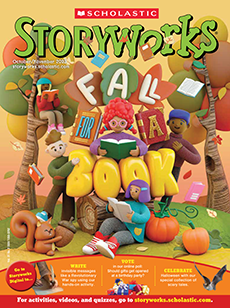ISTOCKPHOTO/GETTY IMAGES
Have you heard that our town is planning to take part in Screen-Free Week this spring? For seven whole days, millions of people around the world agree not to use any digital devices outside of work or school. That means no YouTube. No texting. No Netflix! I hope you’ll join me in saying NO THANKS.
First of all, how would we talk to our friends after school? We wouldn’t be able to message each other about homework, send funny Snaps, share cute dog videos . . . I’m getting lonely and bored just thinking about it.
We’d also feel more stressed. Video games definitely help me relax! I’ve been worried about my big math test next week. Battling enemies in Fortnite gives my brain a break from studying.
But screens aren’t just for fun. They help us learn new skills and express our creativity. How could I deprive the world of my TikTok music videos?
And what about Grandma? If we miss our weekly Skype call, she’s going to jump on a bus and come across the country to make sure we’re all OK.
The only thing we should be shutting down is this terrible idea of a screen-free week. Are you with me?
Love, your sister,
Emma
Have you heard that our town is planning to take part in Screen-Free Week this spring? For seven days, millions of people around the world won’t use any digital devices outside of work or school. That means no YouTube. No texting. No Netflix! I hope you’ll join me in saying NO THANKS.
First of all, how would we talk to our friends after school? We wouldn’t be able to message each other about homework. We wouldn’t be able to send funny Snaps or share cute dog videos. I’m getting lonely and bored just thinking about it.
We’d also feel more stressed. Video games help me relax. I’ve been worried about my math test next week. Playing Fortnite gives my brain a break.
But screens aren’t just for fun. They help us learn new skills and be creative. What would the world do without my TikTok music videos?
And what about Grandma? If we miss our weekly Skype call, she’ll come across the country to make sure we’re OK.
The only thing we should shut down is this terrible idea of a screen-free week. Are you with me?
Love, your sister,
Emma
¿Has oído que nuestro pueblo está planeando ser parte de la Semana Libre de Pantallas esta primavera? Durante siete días completos, millones de personas de todo el mundo han acordado no utilizar ningún aparato digital fuera del trabajo o la escuela. Eso significa que no podrás ver YouTube. No podrás enviar mensajes de texto. ¡No podrás ver Netflix! Espero que te unas a mí para decir NO, GRACIAS.
En primer lugar, ¿cómo vamos a hablar con nuestros amigos al salir de la escuela? No podríamos enviarnos mensajes sobre los deberes, con fotos divertidas o para compartir videos de lindos perritos... Me siento sola y aburrida de solo pensarlo.
Además, estaríamos más estresados. Definitivamente, ¡los videojuegos me ayudan a relajarme! El examen de mate de la semana que viene, me tiene preocupada. Combatir los enemigos en Fortnite le da a mi cerebro un descanso de los estudios.
Pero las pantallas no son solo diversión. Nos ayudan a aprender nuevas destrezas y expresar nuestra creatividad. ¿Cómo podría yo privar al mundo de mis videos musicales de TikTok?
¿Y qué pasaría con Abuela? Si nos perdiéramos nuestra charla semanal por Skype, se subiría a un bus y cruzaría el país para ver si estamos bien.
Lo único que deberíamos apagar es esta terrible idea de la semana libre de pantallas. ¿Estás de acuerdo? Cariños, tu hermana
Emma

